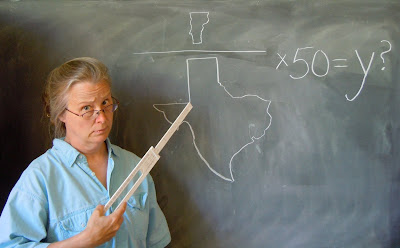I was struck by a comment by Andrea Lafferty, executive director of the Traditional Values Coalition, who was upset by a judge’s recent ruling overturning a federal law banning gay marriage. She said: “We can’t allow the lowest common denominator states, like Massachusetts, to set standards for the country.” Well, how very hypotenuse of her.

I have no idea what she was getting at by that, but I don’t think she was calling Massachusetts the smallest polynomial that is exactly divisible by each denominator of a set of fractions. I imagine she was just intellectually overcome because she personally is easily creeped out by, for instance, the thought of two people of the same or similar sex being able to cosine for a loan, which is important if you don’t live in a commutative property state. Worse yet she suspects that such people, if encouraged, might be inclined to multiply. I’ve tried and tried to understand this point of view, and respond politely, but I can usually sum up my position with one digit.
Ms. Lafferty is indeed interested in education, as evidenced by this quote on the Traditional Values Coalition website: President Barack Obama [is] quietly rushing through legislation that would actually bring cross-dressing teachers into your child’s classroom…your children will be trapped in classes taught by drag queens. God, I hope they’re math teachers.

It’s a little galling to take values lessons from someone who isn’t as smart as a fifth-grader. People who can’t count shouldn’t be in charge of deciding which people don’t count. So I’d like to offer a little arithmetic primer. Visualize a fraction as one number divided by another; we can use the Mason-Dixon line as a visual aid. The denominator is a big blobby state below the line, and the numerator is a little state more on top of things. So, say, if we are trying to determine the fraction of states that uphold liberty for all, we could say that it is one Vermont-Texasth of them. See, that’s not workable. How can we have a situation we can’t even pronounce?
When it comes to civil rights, if we’re going to have one nation indivisible with freedom and justice for all, it’s going to have to be 50/50. That’s my angle, anyway, and I think it’s the right angle.

I do think she was being a tad obtuse. But then, she may have an acute case of math phobia, perhaps brought on by learning algebra, which has all those values-confused variables.
And I think you outdid yourself in that 2nd paragraph – "cosine," indeed!
Go get 'em! Hip-hip-hooray for your post, geometrically opposed to the coalition's angle!
Could you not have worked quadratic equations in there somewhere. Sheesh! The nerve. 🙂
I like your math, Murr. I hereby denominate you for a blogging award.
I am a math teacher, and it is truly sad how long it took for me to come up with even that lame little joke. *sigh*
Yikes, Anvilcloud, quadratic equations can give one hives!! 😉
And I am just so thrilled that Texas fits into that equation. If I didn't love living in Austin so much, I would have high-tailed it out of this backwards state years ago.
Sigh.
Funny math!!! And I just watched your video-Yay! Glad you won-it sure is a well-done piece!
Cost of slide rule–$19
Cost of chalkboard–$207
Cost of cross-dressing outfit–$31
Murr's Math Lesson–priceless!
Damn, that's good.
Oh my gosh, that cosine pun was acute!
But what I really want to know, Murr, is did you draw those states freehand?
And don't you just love a good old chalkboard? I have one from a university remodel of a geology department. It's one of my treasured possessions…
Yep. Priceless. I choked on my water when I saw you and the chalkboard. Murr, I think you could write about ANYTHING and make it hilarious.
OMG, I didn't realize that wearing button-down collar shirts and corduroy jeans to school was a threat to my 9th graders! Am I a cross-dresser?
And what about the current style with the boys pants at half-mast…I'd rather see a well done drag queen that all the boxers we are treated to most days!
What video, Murr? And what did you win?
Oh, it's on the left up there, just below the Political Poop. Ancient history by now. But it was significant because I'd just started writing and was encouraged beyond all reason, and it helped me think of myself in those terms. It led to me writing more and more, including this here blog, which I must say doesn't pay all that well. As we all know!
Caroline, you are obviously a total trannie.
The chalkboard was courtesy the good folks at McMenamin's Kennedy School brewpub, who gave me a key to the room without so much as a who-are-you. I did draw the states freehand. Fortunately Texas is very recognizable. I seem to have a lot of readers from Texas and I hope they aren't put off by my occasional jibes.
You has done outdid yourself! Truly, a classic.
Insert obligatory McMenamin's boo and hiss here!
Superb! Your command of language is at a peak with this one, and couldn't have been aimed at a more well-deserving group. I need to send your blog address to my Aunt Virginia, the shrill-email-forwarding queen who just sent me one that admonishes people to boycott the new Muslim postal stamp from our Muslim president.
How do these morons even figure out how to turn on a computer? "Traditional." Yes, unfortunately ignorance and prejudice is just that. We've on the same wave length this week.
"People who can't count shouldn't be in charge of deciding which people don't count." -Brilliant!!
Believe it or not, I wandered over here hoping for a brief respite from studying for an impending calculus exam! However, you've finally helped me understand the true value of learning math–to better insult one's opponents.
I suspect that even this Maths lesson may be too difficult for some to understand. Maybe we need to go back to 1 plus 1 equals 2, except when it involves a man and a man.
I wanted to say something witty and intelligent but being math challenged, I'm stumped! Fortunately math skills are not a requirement to realizing that people should have the right to love whomever makes them happy.
I'm not going to lie. I haven't visited here yet very often, but I'll be back and hopefully with a wittier comment than this one to complement the wit of your posts, or at least attempt to complement, or should I say, add to the wit of your post, which I'm not sure if I could do because I'm mathematically challenged too. 🙂
Ok you Liberals win – so we might as well just totally go Socialist, that way we can scrap fractions altogether and go completely decimal like the godless Europeans.
I'll cop to the L-word, Robert, but I can only go so far. In case you missed it, here's a very early post about how I feel about the Metric System.
You are parabola right about partial derivatives, but there are always pluses and minuses. Topological closure is inversely proportional to coprime. We refuse to be quotient about it anymore. Square roots do not tuple. Nearest integer functions are not isomorphic. These are just the factorials.
And the winner is!
LOL Love it!
Why aren't you a highly paid columnist, Murr? This is another brilliant post, although I'd have to take exception with your conclusion: Your angle on this subject isn't a right angle, it's a left angle, which is a perverse angle, or obtuse angle or one of those dirty little words ending in an shhhh sound. I'm sure Lafferty knows.
P.S. — Is it just me, or does she look a little like a drag queen herself?
Mike, I was struck by the resemblance also. And as for the first question, I've never figured out how to get anyone to pay me for anything. If I had, I could have racked up a sizable nest egg in the Free Love Seventies.
My God! A slipstick! Wherever did you find that? I'd give a bunch to have mine. Be a riot showing it to kids. They'd think it was amazing. "But Granpa, where do you put the batteries?"
My calculus prof used to (every time) put a note on the board in his lecture room: "This semester's grades were calculated with a sly drool." In my case, it would have been appropriate.
My God! A slipstick! Wherever did you find that? I'd give a bunch to have mine. Be a riot showing it to kids. They'd think it was amazing. "But Granpa, where do you put the batteries?"
My calculus prof used to (every time) put a note on the board in his lecture room: "This semester's grades were calculated with a sly drool." In my case, it would have been appropriate.